Sealife guideThe orangeband surgeonfishAcanthurus olivaceus
Last updated on 09/05/2024 at 09:40 PM
Taxonomy
- Common name: Orangeband surgeonfish
- French name: Poisson chirurgien olive à bande orange, chirurgien à épaulettes, chirurgien gendarme (Polynésie)
- Scientific name: Acanthurus olivaceus (Bloch & Schneider, 1801)
- Family name: Acanthuridae
- Order name: Acanthuriformes
- Class name: Actinopterygii
Description
The orangeband surgeonfish, as its name suggests, has a dominant greenish-brown color with a distinctive large, horizontally elongated oval orange patch that starts behind its eye and ends in a blue-violet comet-shaped tail in the middle of its body.
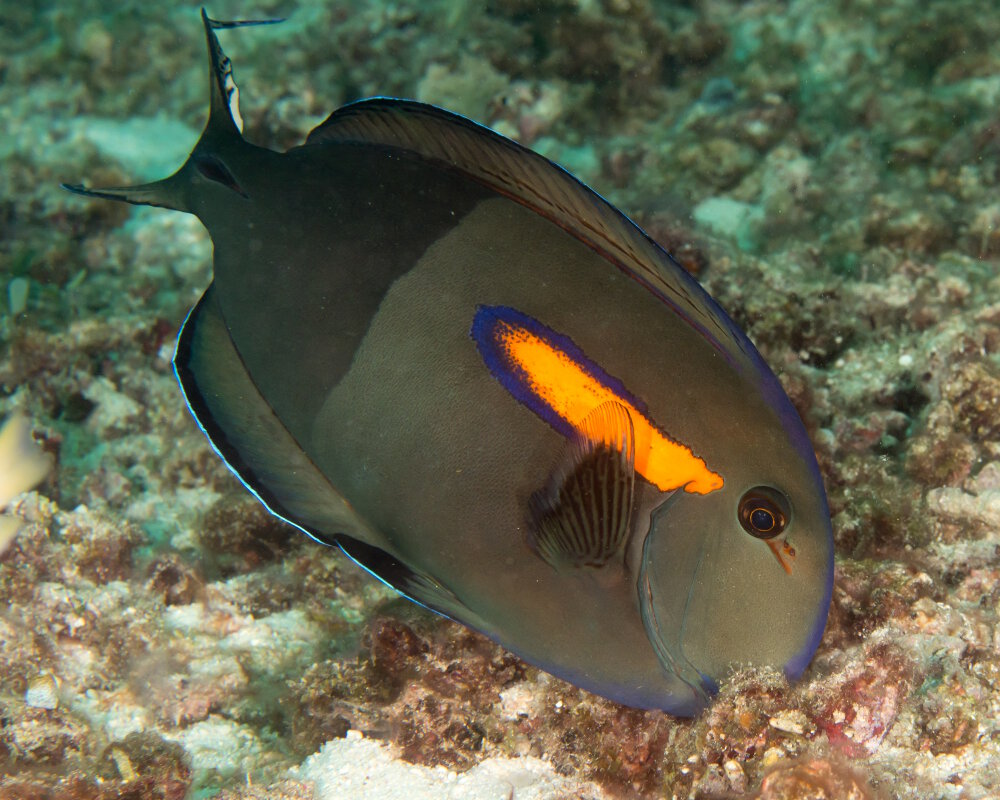
The orangeband surgeonfish (Acanthurus olivaceus) © Rickard Zerpe sous licence Creative Commons
A thin light-colored border outlines its long dorsal and anal fins.
The orangeband surgeonfish is a modest-sized fish, reaching about 8 inches in length when fully grown.
Geographic range
The orangeband surgeonfish is found in the tropical waters of the central Pacific ocean and also in the Indian ocean around the coral reefs of Mauritius.
Diet
Like most surgeonfish, the orangeband surgeonfish is primarily herbivorous. It feeds on algae and detritus scraped from the surfaces of coral reefs and rocky bottoms using its beak-shaped mouth.
Did you know ?
As an herbivore, the orangeband surgeonfish helps maintain healthy coral reefs by controlling algae growth.
The orangeband surgeonfish is listed as many other marine species within The IUCN Red List of threatened species. The orangeband surgeonfish appears in the IUCN Red List since 2012 within the category Least Concern !
Within the same genus
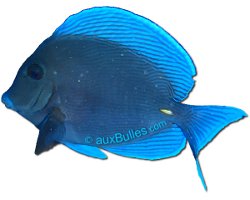
Blue tang surgeonfish
(Acanthurus coeruleus)
(Acanthurus coeruleus)
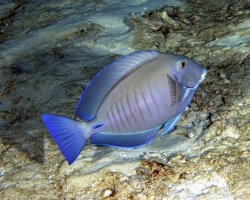
Doctorfish
(Acanthurus chirurgus)
(Acanthurus chirurgus)
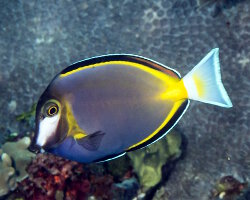
Japanese surgeonfish
(Acanthurus japonicus)
(Acanthurus japonicus)
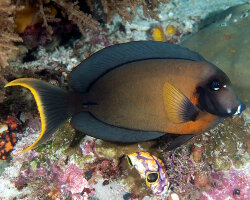
Mimic surgeonfish
(Acanthurus pyroferus)
(Acanthurus pyroferus)
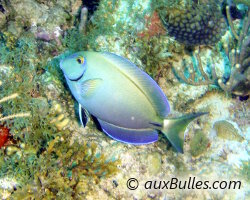
Ocean tang
(Acanthurus bahianus)
(Acanthurus bahianus)
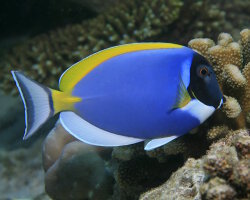
Powder blue tang
(Acanthurus leucosternon)
(Acanthurus leucosternon)
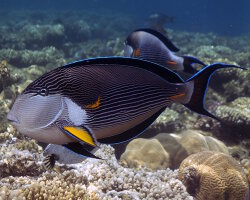
Sohal surgeonfish
(Acanthurus sohal)
(Acanthurus sohal)
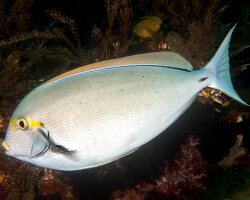
Yellowmask surgeonfish
(Acanthurus mata)
(Acanthurus mata)
Within the same family
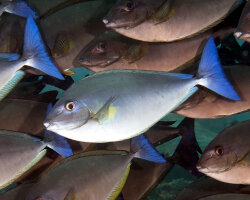
Bluetail unicornfish
(Naso caeruleacauda)
(Naso caeruleacauda)
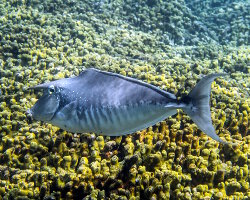
Humpback unicornfish
(Naso brachycentron)
(Naso brachycentron)
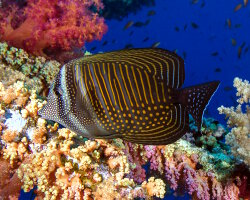
Indian sailfin surgeonfish
(Zebrasoma desjardinii)
(Zebrasoma desjardinii)
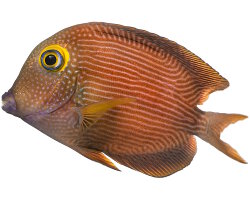
Kole tang
(Ctenochaetus strigosus)
(Ctenochaetus strigosus)
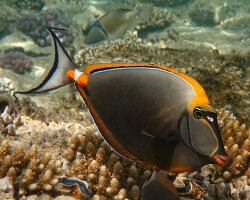
Orangespine unicornfish
(Naso lituratus)
(Naso lituratus)
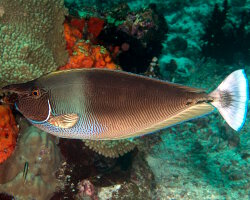
Paletail unicornfish
(Naso brevirostris)
(Naso brevirostris)
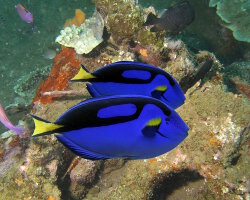
Palette surgeonfish
(Paracanthurus hepatus)
(Paracanthurus hepatus)
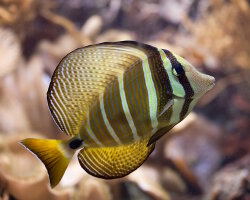
Sailfin tang
(Zebrasoma velifer)
(Zebrasoma velifer)
Discover also

Bigeye tuna
(Thunnus obesus)
(Thunnus obesus)

Masked butterflyfish
(Chaetodon semilarvatus)
(Chaetodon semilarvatus)
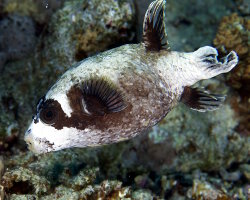
Masked puffer
(Arothron diadematus)
(Arothron diadematus)
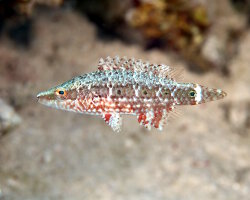
Mental wrasse
(Oxycheilinus mentalis)
(Oxycheilinus mentalis)
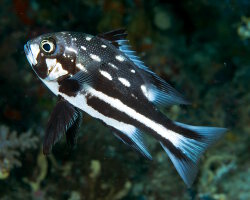
Midnight snapper
(Macolor macularis)
(Macolor macularis)
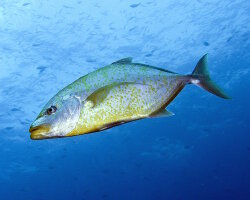
Orangespotted trevally
(Carangoides bajad)
(Carangoides bajad)
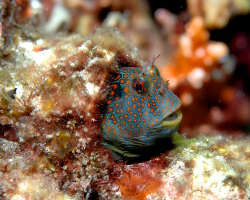
Tessellated blenny
(Hypsoblennius invemar)
(Hypsoblennius invemar)

Yellow blotch angelfish
(Pomacanthus maculosus)
(Pomacanthus maculosus)
Our latestUpdates
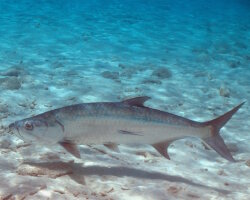
Wednesday, February 18th 2026
The Atlantic tarpon
The Atlantic tarpon is a large coastal fish that can grow up to 8 feet long and weigh over 330 pounds, with a silvery body covered in large, reflective scales. Known as the Silver King, it is famous for its spectacular leaps and fierce fight when hooked by sport fishermen.
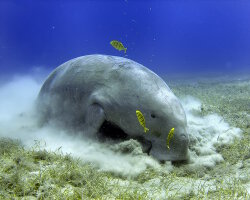
Friday, January 30th 2026
The dugong
Discover the dugong, a gentle “sea cow” of tropical waters. Learn about its habitat, diet, reproduction, morphology, and the threats facing this unique marine mammal.
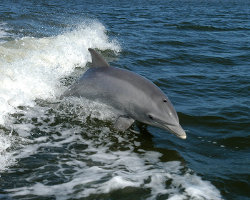
Friday, January 23rd 2026
Dolphins: ocean's smartest creatures
Discover dolphins, the ocean's geniuses: explore their intelligence, social behavior, sophisticated communication, species diversity and vital role in marine ecosystems.
Photo of the Day
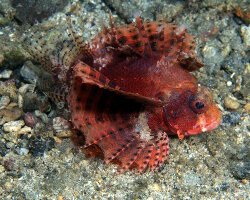
Ptérois nain
(Dendrochirus brachypterus)
(Dendrochirus brachypterus)
